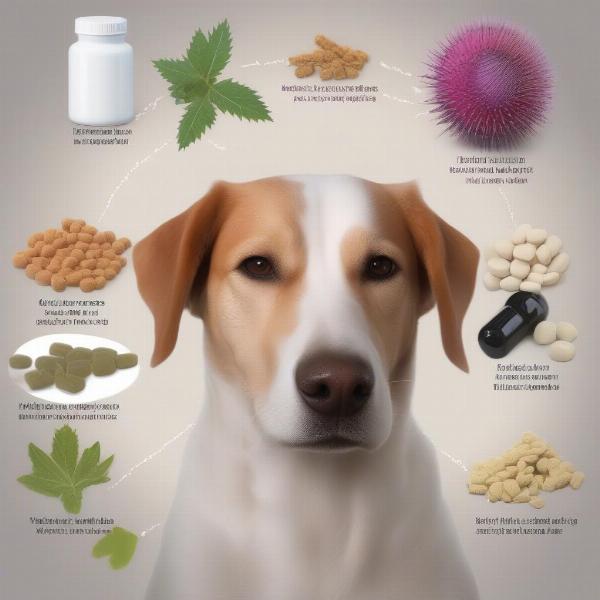Cushing’s disease, or hyperadrenocorticism, is a common endocrine disorder in dogs, often leading to a variety of health issues. Managing this condition typically involves medication, but many owners are exploring supplements for Cushing’s disease in dogs to support conventional treatment and improve their pet’s overall well-being. This article will delve into the potential benefits and risks of various supplements, offering insights into how they might complement veterinary care for dogs with Cushing’s.
Understanding Cushing’s Disease and the Role of Supplements
Cushing’s disease arises from an overproduction of cortisol, a crucial hormone regulating various bodily functions. This hormonal imbalance can manifest in numerous symptoms, including increased thirst and urination, a pot-bellied appearance, hair loss, and skin thinning. While medication is the primary treatment, some supplements may offer additional support by addressing specific symptoms or supporting overall health. It’s crucial to remember that supplements are not a replacement for veterinary prescribed medication and should always be discussed with your vet before incorporating them into your dog’s regimen.
 Supplements for Cushing's Disease in Dogs
Supplements for Cushing's Disease in Dogs
Potential Supplements for Cushing’s Disease in Dogs
Several supplements have shown promise in supporting dogs with Cushing’s. These include:
- Milk Thistle: Known for its liver-supporting properties, milk thistle may help manage the increased liver enzyme levels often seen in dogs with Cushing’s.
- Melatonin: This hormone can help regulate sleep cycles, which may be disrupted due to the hormonal imbalances associated with Cushing’s.
- Lignans: These plant compounds may have anti-estrogen effects, potentially beneficial for dogs with Cushing’s, as the disease can sometimes affect estrogen levels.
- Adaptogenic Herbs: Herbs like Ashwagandha and Rhodiola may help the body adapt to stress, potentially mitigating some of the negative effects of excess cortisol.
It’s essential to note that the efficacy of these supplements can vary between dogs, and more research is needed to fully understand their benefits.
Consulting with Your Veterinarian
Before giving your dog any supplements, it’s crucial to consult with your veterinarian. They can assess your dog’s individual needs, consider potential interactions with existing medications, and recommend appropriate dosages. Your vet can also help you understand the potential risks and benefits of each supplement and monitor your dog’s progress.
Managing Cushing’s Disease Holistically
Managing Cushing’s disease effectively involves a multi-faceted approach. Beyond medication and supplements, a balanced diet, regular exercise, and stress management are crucial for supporting your dog’s overall health and well-being. cushing disease diet for dogs provides valuable information on dietary management, while dog supplements for cushing's offers further insights into supplement options.
Conclusion
Supplements can play a supportive role in managing Cushing’s disease in dogs, potentially alleviating specific symptoms and promoting overall health. However, they should always be used under the guidance of a veterinarian and in conjunction with prescribed medications. By working closely with your vet and incorporating a holistic approach, you can help your dog live a comfortable and fulfilling life despite this challenging condition. Remember to consult with your veterinarian before making any changes to your dog’s treatment plan.
FAQ
- Are supplements a cure for Cushing’s disease in dogs? No, supplements are not a cure. They can support conventional treatment but do not replace veterinary prescribed medication.
- Can I give my dog human supplements? No, it’s important to use supplements specifically formulated for dogs and at the correct dosage. Human supplements can be harmful to pets.
- What are the signs of Cushing’s disease in dogs? Common signs include increased thirst and urination, a pot-bellied appearance, hair loss, and increased panting. grey hair on dogs can offer more information about some of these symptoms.
- How is Cushing’s disease diagnosed? Your veterinarian will conduct various tests, including blood and urine tests, and potentially imaging studies. elevated alkp in dogs may be relevant to some of the diagnostic tests.
- How long can a dog live with Cushing’s disease? With proper management, dogs with Cushing’s can live for several years. how to treat dry skin on dogs can be helpful for managing related skin issues.
ILM Dog is a leading international online resource for dog owners, dedicated to providing expert advice on all aspects of dog care and wellbeing. From breed selection to health and nutrition, training and behavior, to product reviews, ILM Dog empowers owners with the knowledge they need to nurture happy and healthy canine companions. Contact us today for professional guidance on all your dog-related queries: Email: [email protected], Phone: +44 20-3965-8624.